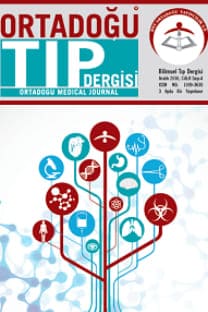Metastatik kolorektal kanser hastalarında 3. basamak tedavi seçeneği: rechallenge kemoterapi
metastatic colorectal carcinoma, rechallenge chemotherapy, third line, salvage
Rechallenge chemotherapy as a third line treatment option for metastatic colorectal carcinoma
___
- 1. Fuchs CS, Marshall J, Mitchell E, Wierzbicki R, Ganju V, Jeffery M, et al. Randomized, controlled trial of irinotecan plus infusional, bolus, or oral fluoropyrimidines in first-line treatment of metastatic colorectal cancer: results from the BICC-C Study. J Clin Oncol, 2007;25:4779-86.
- 2. Hurwitz H, Fehrenbacher L, Novotny W, Cartwright T, Hainsworth J, Heim W, et al. Bevacizumab plus irinotecan, fluorouracil, and leucovorin for metastatic colorectal cancer. N Engl J Med, 2004;350:2335-42.
- 3. Van Cutsem E, Kohne CH, Hitre E, Zaluski J, Chang Chien CR, Makhson A, et al. Cetuximab and chemotherapy as initial treatment for metastatic colorectal cancer. N Engl J Med, 2009;360:1408-17.
- 4. Peeters M, Price TJ, Cervantes A, Sobrero AF, Ducreux M, Hotko Y, et al. Randomized phase III study of panitumumab with fluorouracil, leucovorin, and irinotecan (FOLFIRI) compared with FOLFIRI alone as second-line treatment in patients with metastatic colorectal cancer. J Clin Oncol, 2010;28:4706-13.
- 5. Grothey A, Van Cutsem E, Sobrero A, Siena S, Falcone A, Ychou M, et al. Regorafenib monotherapy for previously treated metastatic colorectal cancer (CORRECT): an international, multicentre, randomised, placebo-controlled, phase 3 trial. Lancet, 2013;381:303–12.
- 6. Nielsen DL, Palshof JA, Larsen FO, Jensen BV, Pfeiffer P. A systematic review of salvage therapy to patients with metastatic colorectal cancer previously treated with fluorouracil, oxaliplatin and irinotecan +/- targeted therapy. Cancer Treat Rev, 2014;40:701-15.
- 7. Jonker DJ, O’Callaghan CJ, Karapetis CS, Zalcberg JR, Tu D, Au HJ, et al. Cetuximab for the treatment of colorectal cancer. N Engl J Med, 2007;357:2040–8.
- 8. Schwartzberg LS, Rivera F, Karthaus M, Fasola G, Canon JL, Hecht JR et al. PEAK: a randomized, multicenter phase II study panitumumab plus modified fluorouracil, leucovorin and oxaliplatin (mFOLFOX6) or bevacizumab plus mFOLFOX6 in patients with previously untreated, unresectable, wildtype KRAS exon 2 metastatic colorectal cancer. J Clin Oncol, 2014;32:2240-7.
- 9. Douillard JY, Siena S, Cassidy J, Tabernero J, Burkes R, Barugel M et al. Final results from PRIME: randomized phase III study of panitumumab with FOLFOX4 for first-line treatment of metastatic colorectal cancer. Ann Oncol, 2014;25:1346-55.
- 10. Heinemann V, von Weikersthal LF, Decker T, Kiani A, Vehling-Kaiser U, Al-Batran SE et al. FOLFIRI plus cetuximab versus FOLFIRI plus bevacizumab as first-line treatment for patients with metastatic colorectal cancer (FIRE-3): a randomised, open-label, phase 3 trial. Lancet Oncol, 2014;15:1065-75.
- 11. Tonini G, Imperatori M, Vincenzi B, Frezza AM, Santini D. Rechallenge therapy and treatment holiday: different strategies in management of metastatic colorectal cancer. J Exp Clin Cancer Res. 2013;18:32:92.
- 12. Maindrault-Goebel F, Tournigand C, André T, Carola E, Mabro M, Artru P et al. Oxaliplatin reintroduction in patients previously treated with leucovorin, fluorouracil and oxaliplatin for metastatic colorectal cancer. Ann Oncol, 2004;15:1210–14.
- 13. Suenaga M, Mizunuma N, Matsusaka S. A phase II study of oxaliplatin reintroduction in patients pretreated with oxaliplatin and Irinotecan for advanced colorectal cancer (RE-OPEN study): reports of interim analysis [abstract]. J Clin Oncol, 2012;30:580.
- 14. Kang BW, Kim TW, Lee JL, Ryu MH, Chang HM, Yu CS, et al. Bevacizumab plus FOLFIRI or FOLFOX as third-line or later treatment in patients with metastatic colorectal cancer after failure of 5-fluorouracil, irinotecan, and oxaliplatin: a retrospective analysis. Med Oncol, 2009;26:32–7.
- 15. Ishiguro M, Watanabe T, Yamaguchi K, Satoh T, Ito H, Seriu T, et al. A Japanese post-marketing surveillance of cetuximab (Erbitux(R)) in patients with metastatic colorectal cancer. Jpn J Clin Oncol, 2012;42:287–94.
- 16. Jensen BV, Schou JV, Johannesen HH. Cetuximab every second week with irinotecan in patients with metastatic colorectal cancer refractory to 5-FU, oxaliplatin, and irinotecan: KRAS mutation status and efficacy. ASCO Meet Abstr 2010;28:3573.
- 17. Pfeiffer P, Nielsen D, Yilmaz M, Iversen A, Vejlø C, Jensen BV. Cetuximab and irinotecan as third line therapy in patients with advanced colorectal cancer after failure of irinotecan, oxaliplatin and 5-fluorouracil. Acta Oncol, 2007;46:697–701.
- 18. Pfeiffer P, Nielsen D, Bjerregaard J, Qvortrup C, Yilmaz M, Jensen B. Biweekly cetuximab and irinotecan as third-line therapy in patients with advanced colorectal cancer after failure to irinotecan, oxaliplatin and 5-fluorouracil. Ann Oncol, 2008;19:1141–5.
- 19. Sogabe S, Komatsu Y, Yuki S, Kusumi T, Hatanaka K, Nakamura M, et al. Retrospective cohort study on the safety and efficacy of bevacizumab with chemotherapy for metastatic colorectal cancer patients: the HGCSG0801 study. Jpn J Clin Oncol, 2011;41:490–7.
- 20. Geva R, Vecchione L, Tejpar S, Piessevaux H, Van Cutsem E, Prenen H. Bevacizumab plus chemotherapy as salvage treatment in chemorefractory patients with metastatic colorectal cancer. Onco Targets Ther, 2013;6:53–8.
- Başlangıç: 2009
- Yayıncı: MEDİTAGEM Ltd. Şti.
Pınar Şen, Erkan Yula, Tuna Demirdal, Selçuk Kaya, Salih Atakan Nemli, Mustafa Demirci
Kronik venöz yetmezlik ve güncel tedavi seçenekleri
Ağızda karbonhidrat çalkalamanın futbolcularda aralıklı sprint performansı üzerine etkileri
Hakan KARABIYIK, Raci KARAYİĞİT, Burak Çağlar YAŞLI, Mitat KOZ, Gülfem ERSÖZ
Ayça Tuba DUMANLI ÖZCAN, Erdal ÖZCAN, Ebru ÇANAKÇI, Korhan KILIÇ
Serkan TURSUN, Ayşegül Alpcan, Cihat Şanlı, Mehmet KABALCI
Adıyaman ilinde kan kültürlerinden izole edilen brucella türlerinin identifikasyonu
Sadık AKGÜN, Gülnur Tarhan, Hakan Sezgin Sayıner
Segmentation of blood vessels from retinal images
Halil Murat ÜNVER, Ebru DUMAN AYDOĞAN, Yunus KÖKVER
Bilateral epidural hematom: olgu sunumu
Muhammed Taha Eser, Erdal Reşit YILMAZ, Hüseyin Hayri KERTMEN, Mehmet Ziya ÇETİNER
Eksudatif tonsillit ayırıcı tanısında tularemi ve seyrinde görülen cilt bulguları: iki olgu sunumu
Korhan KILIÇ, Ebru ÇANAKÇI, Erdal ÖZCAN, Ayça Tuba ÖZCAN DUMANLI
